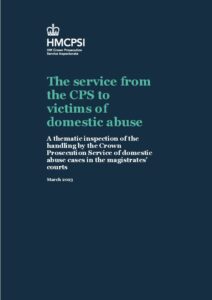The service from the CPS to victims of domestic abuse
The service from the CPS to victims of domestic abuse (PDF, 1.4 MB)
A thematic inspection of the handling by the Crown Prosecution Service of domestic abuse cases in the magistrates’ courts
In England and Wales, an estimated 2.4 million adults experienced domestic abuse in the year ending March 2022. The CPS’s policy statement makes clear that domestic abuse cases are amongst the highest priority in the criminal justice system.
In this thematic inspection, we make a rigorous assessment of how the CPS addresses domestic abuse so that victims and survivors, ministers, and the public, can be assured that the service being provided, and the standards relied on, are fit for purpose.
The CPS is doing many things well in these cases, but this report identifies compliance issues which the CPS should address. It also makes six recommendations which we believe will enhance the prospects for success in domestic abuse cases.
Message from HM Chief Inspector
Domestic abuse is a social crisis. Many of us instinctively think that this kind of abuse involves only physical and sexual violence. But it also includes harassment, stalking and online and digital abuse as well as coercive control which can include psychological, emotional, and financial abuse. The most serious instances of domestic abuse can lead to the death of a victim. Almost all victims of domestic abuse are women and girls but of course a minority are men. These are the appalling facts which confront us as a society.
HMCPSI has a statutory duty to inspect the operation of the Crown Prosecution Service (CPS) and the Serious Fraud Office (SFO). The purpose of our inspection work is to drive improvements and build public confidence in our national prosecution bodies.
In 2022 I decided to inspect the Crown Prosecution Service’s conduct of cases involving domestic abuse. I wanted to know whether the CPS is effective in building strong domestic abuse cases that support and protect victims of this widespread crime.
The CPS rightly regards domestic abuse cases as one of the highest priorities in the Criminal Justice System. Significantly, these cases constitute 13% of the CPS’s overall caseload. During our inspection we met with committed and passionate domestic abuse prosecutors. The CPS takes domestic abuse very seriously and they highlight the need for the support and safety of victims throughout the life of a criminal case.
While the CPS is a very positive force in domestic abuse prosecutions, we have found a number of areas where improvements need to be made. Our recommendations to the CPS are set out in full in our report: “The Service from the CPS to the Victims of Domestic Abuse.” These are recommendations which I believe are achievable. The desired improvements will be reached more quickly by better cooperation between the police and the CPS.
During the course of this inspection, we have come to admire and respect the tireless work of Independent Domestic Violence Advisors (IDVAs) who support victims of domestic abuse to become safer, sooner. We need to support IDVAs. Victims of domestic abuse must interact with the police, the CPS and the courts, and often housing, mental health, and children’s services. IDVAs help victims navigate these myriad services and work to provide long term support for victims and their families.
IDVAs do extraordinary work and they need to be consistently funded by government across England and Wales. It should not be a postcode lottery as to whether a victim of domestic abuse receives the assistance of an IDVA.
Tragically, domestic abuse is pervasive. In the year ending March 2022 an estimated 2.4 million adults suffered from domestic abuse in England and Wales. One in five children live with domestic abuse.
These stark figures reflect the scale of the challenge we face but we can do much better now in addressing domestic abuse because we already have the tools to do the job. We can reduce this scourge on our society which damages our precious human capital and leaves in its wake so much misery and unnecessary suffering.

